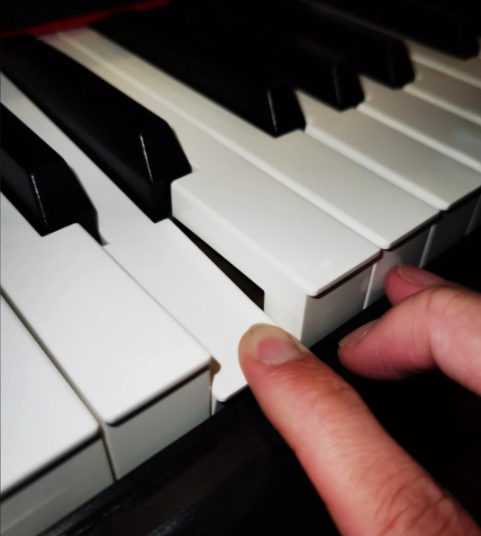- 1. Restoring the "Physical Touch" of Traditional Pianos, Enhancing Playing Authenticity
- 2. Enhancing the Precision of Force Control, Suitable for Expressive Performances
- 3. Cultivating Correct Playing Habits, Suitable for Long-Term Practice
- 4. Enhancing Playing Immersion, Reducing the "Electronic Feel"
- 5. Wider Application Scenarios, Catering to Both Practice and Professional Performances
- Summary: The Core Value of Weighted Keys — "Upgrading from 'Playing' to 'Performing'"

VEAZEN, as a professional manufacturer in the comprehensive musical instrument field, uses professional weighted keys in many models of its digital pianos. So, what exactly are the advantages of weighted keys?
In the selection of digital pianos, hammer action keys (commonly known as “weighted keys”) are the first choice for many professional players and advanced learners. Their core design is to simulate the physical string-striking mechanism and tactile feedback of traditional acoustic pianos. The advantages of such keys are mainly reflected in the following aspects:
1. Restoring the “Physical Touch” of Traditional Pianos, Enhancing Playing Authenticity #
The keys of a traditional piano produce sound by hammers striking the strings. When pressing the keys, you can feel the gradually increasing weight (the bass range is heavier, and the treble range is lighter) and the resistance of the hammer rebound. Weighted keys accurately replicate this physical feedback through built-in metal weights and simulated hammer structures:
- Weight of the counterweight: Metal blocks are added under the keys to make the touch of the keys close to the “heavy force” of a traditional piano, avoiding the “light and floating” feeling of electronic keyboards.
- Progressive weighting: The keys in the bass range have heavier counterweights, and those in the treble range are lighter, which conforms to the logic in piano playing that “the bass requires more force control, and the treble is more sensitive”.
- String-striking feedback: When pressing a key, you can feel the slight sense of frustration when the hammer “hits the bottom”. When releasing the key, there is a natural rebound resistance, which is highly consistent with the real string-striking action.
This touch is crucial for people accustomed to traditional pianos, as it can reduce the “adaptation cost” when switching from a piano to a digital piano.
2. Enhancing the Precision of Force Control, Suitable for Expressive Performances #
The charm of the piano lies in the “contrast between strong and weak” (i.e., “touch sensitivity”), and the touch response range of weighted keys is wider and more delicate:
- When pressing the keys lightly, the sound is soft; when striking hard, the sound is loud, which is consistent with the principle of a traditional piano controlling the volume through “string-striking speed”.
- The touch sensitivity level of weighted keys is usually higher (such as 128 levels or more), which can accurately capture the subtle changes in finger force, realizing complex expressive treatments such as “crescendo, decrescendo, and sforzando”.
- For techniques that require “finger control” (such as legato, staccato, and trill), the resistance feedback of weighted keys can help players better grasp the depth of key pressing, avoiding “force loss control” caused by overly light keys.
3. Cultivating Correct Playing Habits, Suitable for Long-Term Practice #
For learners (especially children), weighted keys can help establish a scientific way of finger force application:
- A traditional piano requires the coordination of fingers, wrists, and arms to exert force. The resistance of weighted keys can exercise the support and force control of fingers, avoiding reliance on “inertial key pressing” (the light keys of electronic keyboards are prone to cause loose finger force).
- Formal occasions such as grading exams and performances usually use traditional pianos. Long-term practice with weighted keys can make finger muscles form “piano-like memory”, avoiding “touch faults” when changing pianos.
4. Enhancing Playing Immersion, Reducing the “Electronic Feel” #
In addition to the touch, the “acoustic feedback” of weighted keys is also closer to the real thing:
- Some high-end weighted keys will simulate the “mechanical sound” of hammers striking the strings (such as the slight sound made by Yamaha’s “escapement structure”). Combined with the tone of external speakers or headphones, it creates an “immersive” playing atmosphere.
- The rebound speed of the keys is faster and more stable, which is suitable for technical passages such as fast scales and arpeggios, avoiding “stuck” caused by too slow key rebound.
5. Wider Application Scenarios, Catering to Both Practice and Professional Performances #
- Professional performances: During stage performances and recording, the authenticity of weighted keys can make players more engaged, and their expressiveness is closer to that of traditional pianos.
- Daily practice: For people who need to maintain the piano touch for a long time (such as students and teachers), weighted keys are an ideal choice to “replace pianos”, especially suitable for scenarios with limited space where it is inconvenient to place a traditional piano (such as apartments and dormitories).
- Style adaptation: Whether it is classical, jazz, pop, or other styles, the delicate control of weighted keys can meet the requirements of different music styles for force and touch.
Summary: The Core Value of Weighted Keys — “Upgrading from ‘Playing’ to ‘Performing'” #
Ordinary electronic keyboards or digital pianos without weighted keys are more suitable for entertainment, entry-level use, or simple accompaniment. The significance of weighted keys is to upgrade digital pianos from “simulated sound-producing tools” to “musical instruments that can meet professional performance needs”. Their advantage is not only “the touch is like a piano” but also that through physical feedback and force control, players can “speak” with their fingers like treating a traditional piano, conveying the emotions and details of music.
If your needs are “long-term practice, professional performance” or “being accustomed to the piano touch”, weighted keys are a must; if you only play and sing occasionally or for entertainment, you can also choose lightweight keys according to your budget.



